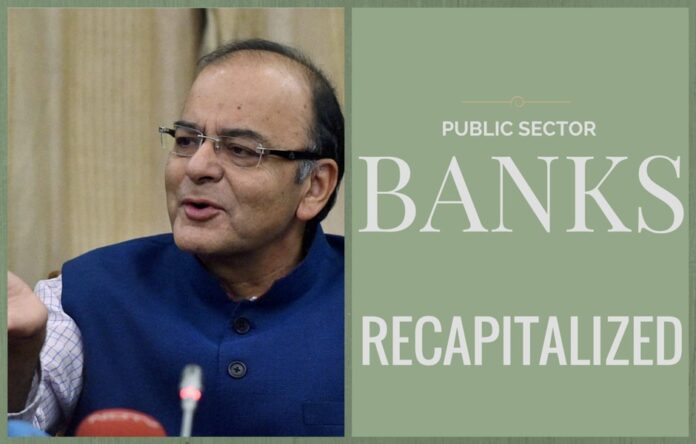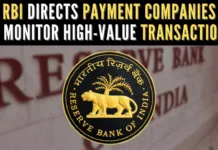
PerformanceGurus Staff
New Delhi
Waking up to the distressed situation of the state-run banks which are plagued with rising bad debts, the Government on Friday announced a slew of measure and for the first time brought in professional from private sectors to head three of these banks.
The revamp plan for the banks has been named ‘Indradhanush’. It also includes setting up of a Bank Board Bureau (BBB) for broad-level appointments and a performance-based monitoring mechanism. Announcing the revamps plan, , Finance Minister Arun Jaitley said that “even though challenging situation did exist, there is no cause for panic… Cause for panic or alarm does not exist.”
The government will also set up a Bank Investment Committee, which will act as a holding company for shares on behalf of the government.
The announcement came after the market hours, but in anticipation of the reforms, the shares of PSU banks rose anything between 4 to 9% on the Mumbai stock exchange and investors hoped that the worst may be soon over for this under-performing sector of the economy.
There was another good cheer for the banks. Data released on Friday said that for the ninth month in a row the Wholesale Price Index (WPI) continued to fall. For the month of July it slipped to a historic low of (-)4.05% on cheaper vegetable and fuel cost. This has raised hopes of an RBI rate cut ahead of the September 29 policy meet.
The WPI number follows retail inflation (CPI) data, which had slipped to a record low of 3.78% in July. The overall wholesale price index-based (WPI) inflation was (-)2.40 per cent in June, government data showed today. It has been in the negative zone since November 2014. A year ago in July 2014, inflation was 5.41%.
On his August 4 monetary policy announcement RBI Governor Raghuram Rajan had hinted that the central bank may cut interest rate even out of the policy cycle depending on how macroeconomic indicators play out.
The start-rank banks have been bleeding from mounting bad debts and their shares have almost halved over the last one year. The government announced a seven-point plan including a Rs.20,000 crore ($3 billion) immediate fund infusion, creation of a single holding company and minimizing political interference.
In a revolutionary move, the Government has brought in top notch professionals to head some of these PSU banks. Bank of Baroda and Canara Bank have become have become first state-run banks to be headed by private sector professionals.
In addition to these two banks, the Government also named the managing directors and chief executive officers of the Bank of India, IDBI Bank and Punjab National Bank. They will be headed by serving officials in other government owned banks. But in their case also, two non-Executive Chairman are from the private sector.
Managing Director and CEO of VBHC Value Homes Pvt Ltd P S Jayakumar (53) has been selected to head Bank of Baroda. MD and CEO of private sector lender The Laxmi Vilas Bank Rakesh Sharma (57) will head Canara Bank.
M O Rego (Deputy Managing Director, IDBI Bank), Kishore Kharat Piraji (Executive Director, Union Bank of India), and Usha Ananthasubramanian (CMD, Bhartiya Mahila Bank) are the new MD and CEOs of Bank of India, IDBI Bank and Punjab National Bank, respectively. Ravi Venkatesan (51), Independent Director, Infosys has been appointed as non-Executive Chairman of Bank of Baroda. T N Manoharan (59), Director, Tech Mahindra, Public Health Foundation is non-Executive Chairman of Canara Bank.
G Padmananbhan (Retired ED of RBI), G Narayanan (Retired ED, Indian Overseas Bank) and T C V Subramainian (Retired CMD, Exim Bank) have been appointed as non-Executive Chairman of Bank of India, Vijaya Bank and Indian Bank, respectively.
“The entire process of selection for MD & CEO was revamped. Private sector candidates were also allowed to apply for the position of MD & CEO of the five top banks. Three stage screening was done for the MD’s position culminating into final interview by three different panels.”
– Financial Services Secretary Hasmukh Adhia
Finance minister Arun Jaitley said that the problem of the bad loans was left unattended by the previous government has continued largely because of slowdown in some sectors like steel, power, highways, power distribution companies and sugar.
“Since the present government took over, our policy was that commercial decisions must be taken on commercial considerations and the level of political interference in the functioning of banks have to be minimized.”
Elaborating on the seven-point agenda for revamp of PSBs, Financial Services Secretary Hashmukh Adhia said: On the issue of empowerment, Adhia said the government has issued a circular that it will not interfere in the functioning of the banks and they are encouraged to take their decision independently keeping the commercial interest of the organization in mind.
“A cleaner distinction between interference and intervention has been made. With autonomy comes accountability, accordingly banks have been asked to build robust Grievances Redressal Mechanism for customers as well as staff so that concerns of the affected are addressed effectively in time bound manner,” he said.
Talking about framework of accountability, the Secretary said that a new framework of Key Performance Indicators (KPIs) to be measured for performance of PSBs is being put in place.
“It is divided into four sections totaling up to 100 marks. The quantum of performance bonus is also proposed to be revised shortly to make it more attractive. We are also considering ESOPs for top management of PSBs,” he said.
The capital requirement for the PSU banks next four years up to 2018-19 is likely to be about Rs.180000 crores ($26.5 billion).
Note:
1. The conversion rate used in this article is 1 US Dollar = 65.24 rupees










